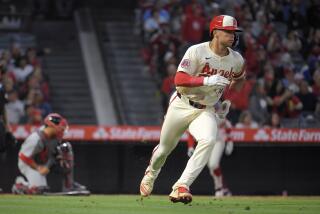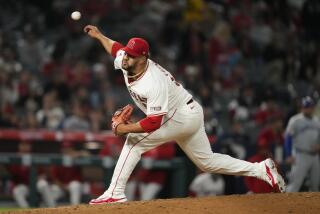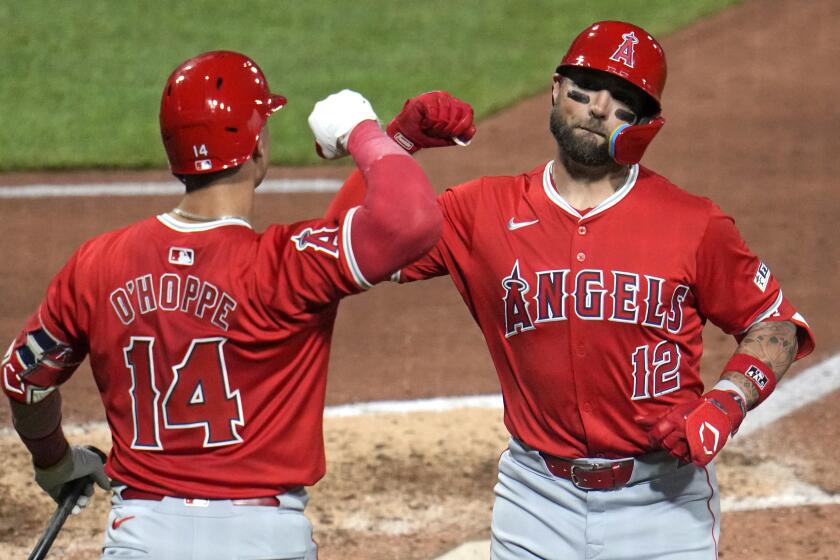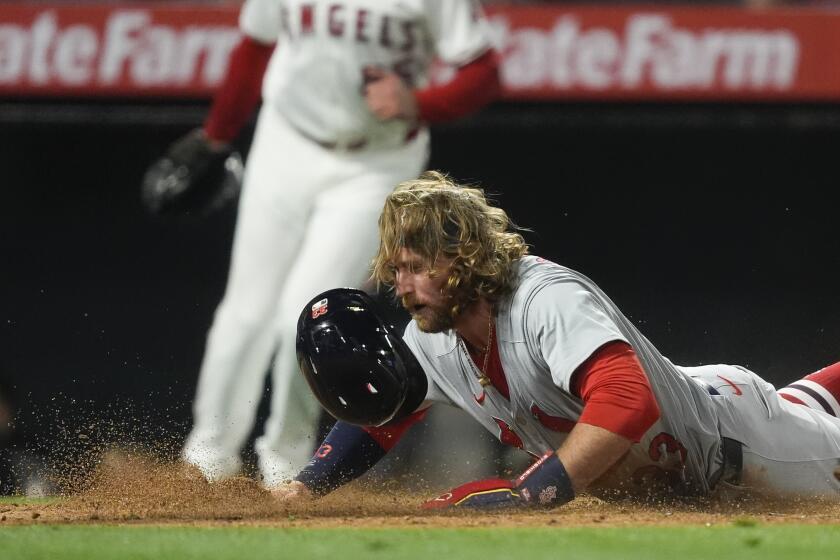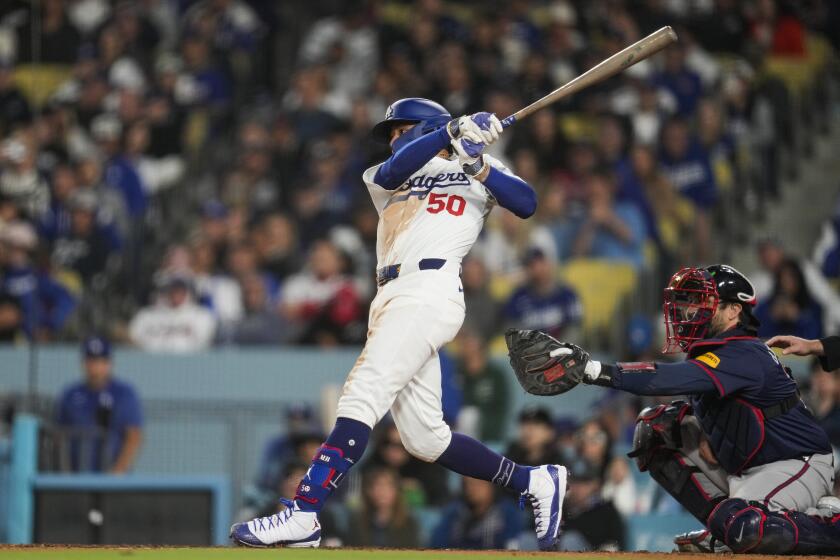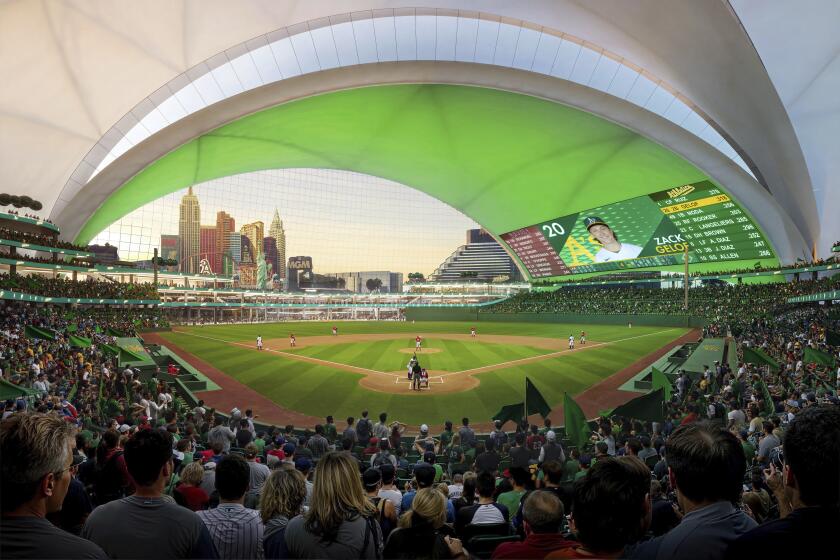ANGELS 1988 PREVIEW SECTION : THEY’RE ON THE MOVE : White, Davis and Ray Are Adjusting in the Outfield
Will Johnny be good in left?
Is there a warm spot in Chili’s heart for right?
Can Devon deal with the attention of center?
There’s no way to cheat on this quiz because no one’s really sure yet whether the newly aligned Angel outfield will come together or fall apart. If you want the answers, you’ll just have to stay tuned.
Most of the folks in the red, white and blue uniforms are betting on “come together,” of course.
And there is no reason to believe that Johnny Ray won’t master left field, despite a shaky start and a less-than-gung-ho attitude. Chili Davis, who played mostly in center with the Giants, is beginning to feel at home, both with his new teammates and his new position. Devon White is a marvelous athlete who needs only to learn to take charge to take over center.
The talent is there, but talent alone does not make a great outfield. Just ask Lee Walls, the coach hired to oversee Ray’s transition from second baseman to left fielder and play fairy godfather to the whole trio.
“It’ll take a full season of playing together before they become a great defensive unit,” Wallis said. “A lot of ground balls, a lot of fungoes and communication. Communication makes teams win.”
Whatever the short-run defensive costs, the Angels are counting on the offensive returns to far outweigh the deficiencies. Last season, with Gary Pettis’ Gold Glove in center and White in right, the Angels had two-thirds of the best defensive outfield in baseball. But Pettiscouldn’t carry his weight at the plate.
“I tell you one thing, I sure like the sound of the ball coming off Chili Davis’ bat and Johnny Ray’s bat compared to some of the weaker bats we’ve had in the past,” former Manager Gene Mauch said earlier this spring.
“When I told Devon that he was going to be playing center, he busted out in a big smile and said, ‘Skip, you haven’t seen me play centerfield, yet.’ We’ll see. But I feel real good about it.
“Just like everyone else in our division, we like our outfield (offensively). Now we’ll see who catches the ball the best.”
Only time will tell if . . .
THERE’S HOPE FOR RAY
Ray backs away toward the warning track as White chases down a drifting fly ball in left-center of Angels Stadium in Palm Springs.
Ray seems to have gotten the hang of yelling, “You got it,” anyway.
This is a skilled and proud athlete who has been, well, let’s say it, forced to switch positions after seven seasons in the major leagues. The potential for embarrassment is there every time he jogs out to left. Ray does not like to be embarrassed.
He’s certainly not overjoyed with learning a new position, but he’s biting the bullet and bearing down . . . for now.
“I’m keeping an open mind,” Ray said. “Right now, I’m being tolerant and doing what I have to do. Gradually, I’m learning about playing the outfield.
“I’ve been and infielder all my life and I can’t say I know anything about playing the outfield. But I’m trying hard to make the adjustment. We’ll see what happens.”
Mention the word reluctance to Walls and he looks genuinely surprised.
“You see, I’ve never heard that side from him” Walls said. “He’s shown no reluctancy with me. Maybe it’s in the back of his mind, but I can’t read his mind.
“Johnny’s a fine athlete. He’s as good as anyone charging balls. He needs to work on his footwork and build some confidence. But he’s a fine athlete, and good athletes can play damn near anywhere.”
Walls should know. He played in the majors for 10 years and says he would never have made it past seven if it weren’t for the fact he played third base, first base and all three outfield positions.
Ray made a couple of nice catches the other day and Walls yelled, “Who’s that guy in left?” as he ran up the tunnel to the clubhouse after the game. Later, he said he and Ray had looked at tapes of how Ray went back on balls and made some adjustments in his technique.
Asked about it later, Ray said, “What tapes? He must have watched them alone.”
All the attention--not to mention confusion--surrounding the new defensive position hasn’t seemed to affect Ray’s offense, which, of course, is the main reason he’s in the lineup. After the first 15 games of the spring, he was hitting .316 with a double, a triple, a home run and 4 RBIs in 32 at -bats.
White, whose legs will likely save Ray’s ego often this season, just wants to see a happy, sweet-swinging Johnny Ray in the lineup.
“I’m confident it will work out well,” White said. “I feel Johnny’s gonna do a good job. We know how he can hit. He’s got plenty of athletic ability. Now he just needs to get some confidence in left.”
And maybe not get too many sinking line drives right off the bat.
HE’S RIGHT FOR RIGHT
Chili Davis is a former catcher who was told to learn to play center field if he wanted to play baseball.
“And I learned to love to play center,” he says.
Now, Davis must learn to love right. The marriage of convenience is coming along fine, thanks.
“Right or center, it doesn’t matter,” he said. “I think we can have a good defensive outfield. All we need is to play together a little, get to know each other’s limits and ranges, and we’ll be OK.
“I think center is easier in terms of picking the ball up off the bat because you have the perfect angle. But right requires less running. Your best outfield should have your best arm in right, but, well, it doesn’t always work out that way.”
Walls says Davis’ arm is not that weak and predicts that he will be a very good defensive right fielder by season’s end.
That should be good enough for the Angels, who are also looking forward to Davis’ versatility as hitter. Davis hit 24 home runs for San Francisco last year. In the first 16 games of spring, he was hitting .340 with 2 doubles, a triple, 2 homers and 12 RBIs.
HE LIKES THE MIDDLE
“Devon White is not a great center fielder by any means,” Walls said. “But he’s learning every day and he has absolutely tremendous ability. Plus, he’s got so much little kid in him.”
White was not only the best right fielder Mauch had ever seen last season, he was a rookie offensive sensation, with 24 home runs and 87 RBIs.
Good news, bad news. Everyone seems to be expecting more.
“Someday, Devon will understand what it means to be a three-dimensional ballplayer,” Walls said. “He’ll learn how to use all the tools God gave him and they’ll never get him out.
“When he learns to bunt, hit the ball by the third baseman and into to deep short, he’ll hit better than .300 every year. Now, he just goes up there and swings and look what he does with just pure, natural hitting ability.”
White is thinking about another kind of adjustment, too, these days. He considers himself a center fielder at heart, but he knows he has to be a leader of men who are three and six years older.
“Any position switch can be difficult,” White said. “In center, well, it’s a little intimidating, telling older guys where to move, but I know I’m going to have to do that.
“And you have to get a better jump on the ball and you have a lot more room to cover. You have to cover the alleys.”
Walls wants White to catch every ball he can get his hands on and White has the legs to grab a lot. White hasn’t taken command of the outfield yet, though.
“Devon is the man out there,” Walls said. “Every day, I challenge him to take charge. I tell the other guys, ‘You look to the Man. When Devon moves, you move.’ And that way there’ll be no gaps.
“It’s Devon’s responsibility to see that there’s communication and that this unit takes pride in itself.”
White gets the picture. But he doesn’t want to be dominating a figure and end up having to do all the work.
“If you start getting to everything, then your right and left fielders get lazy,” White said. “And I know it happens. Remember, I played next to Gary, and he had fantastic range.”
THERE’S A HITCH
Mauch was talking about the grand plans for a new, improved--not to forget power-packed--outfield. A lot of hard work, even a few hard feelings, had resulted from the idea. But he’s sure it will work.
The plan, like most plans, hinges on other contingencies, though, and, for just a brief moment, Mauch allowed himself to reflect on one.
“Of course a lot depends on (Mark) McLemore,” Mauch said.
“He’s working hard on his defense and if he hits enough and plays second the way he can, it just makes a lot of sense.”
McLemore hit .236 as a rookie last year, which was enough to keep him in the lineup until the Angels acquired Ray. McLemore got only 16 at-bats after August last season.
“I think I did what they asked last year,” McLemore said, “and I don’t feel any added pressure. I’m not keeping an eye on Johnny’s progress in left, I’m watching out for me.”
Mauch believes the year of experience will help McLemore’s on-base percentage. McLemore has responded to leading off the batting order most of the spring, hitting .304 through the first 15 games, with a .429 on-base percentage.
“I feel great,” McLemore said. “This is the best I’ve ever hit the ball. You gotta start feeling great sometime and it might as well be right from the beginning.”
Tell that to Johnny Ray.
More to Read
Go beyond the scoreboard
Get the latest on L.A.'s teams in the daily Sports Report newsletter.
You may occasionally receive promotional content from the Los Angeles Times.
